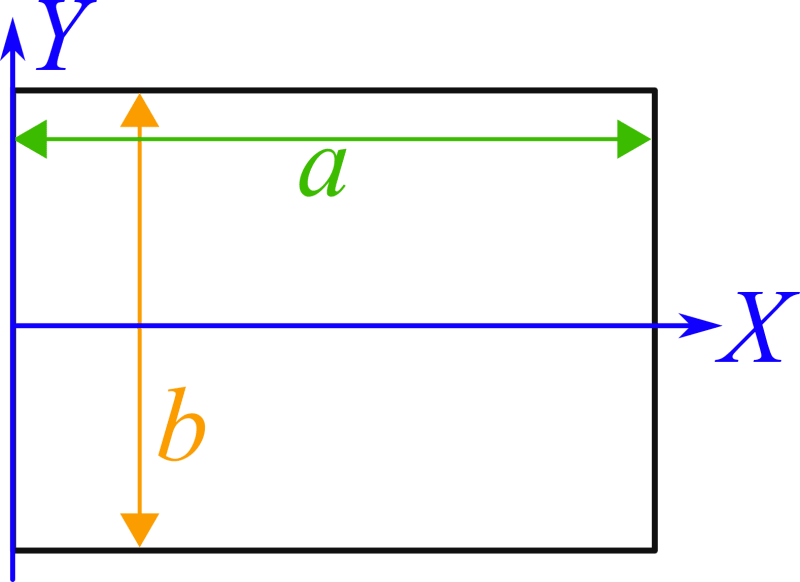enea19
Mechanical
- Jun 20, 2019
- 2
I hope I can get some help with this problem as I've been struggling with it for a long time. I have a helical tension spring with radius R and a square wire cross section and made of orthotropic material. I'm trying to derive an equation for the spring constant k by equating the energy stored by the spring 1/2 k x^2, where x is the distance stretched, with the energy stored U_t by a shaft under torsion of equivalent length so
1/2 k x^2=U_t

As explained in the title, I have a particular situation because the material is orthotropic and the cross-section of the shaft is a rectangle as shown in the image above. I already have an expression for the torsional rigidity GJ of an orthotropic rectangular shaft with shear moduli G_{zx} and G_{zy}:
GJ=a b^3 G_{zx} [β]
where [β] is a series where you sum from n=1,3,5... to infinity.
When I equate
1/2 k x^2=U_t=(GJ/2L) [θ]^2
I can plug in [θ]=x/R (the angle the shaft has been twisted by is roughly equal to the angle each coil of the spring gets stretched by) so
k=GJ/(L R^2)
where L=2[π] R N_a and N_a are the number of active coils in the spring. To me the equation looks complete but the problem is that when I enter values like a=0.005m, b=0.0025m, G_{zx}=1159.1MPa, G_{zy}=974.3MPa, N_a=5, and R=0.01m I get k=632.642 instead of k=2780, which is the right answer.
Since I have that the torque on the shaft is T=a b^3 G_{zx} [θ] [β] I tried other equations for U_t where U_t=(1/2) T [θ] or U_t=(T^2 L)/2GJ but none of the answers come even close, 198.75 and 62.4393. Am I doing something wrong when equating the two energies?
1/2 k x^2=U_t

As explained in the title, I have a particular situation because the material is orthotropic and the cross-section of the shaft is a rectangle as shown in the image above. I already have an expression for the torsional rigidity GJ of an orthotropic rectangular shaft with shear moduli G_{zx} and G_{zy}:
GJ=a b^3 G_{zx} [β]
where [β] is a series where you sum from n=1,3,5... to infinity.
When I equate
1/2 k x^2=U_t=(GJ/2L) [θ]^2
I can plug in [θ]=x/R (the angle the shaft has been twisted by is roughly equal to the angle each coil of the spring gets stretched by) so
k=GJ/(L R^2)
where L=2[π] R N_a and N_a are the number of active coils in the spring. To me the equation looks complete but the problem is that when I enter values like a=0.005m, b=0.0025m, G_{zx}=1159.1MPa, G_{zy}=974.3MPa, N_a=5, and R=0.01m I get k=632.642 instead of k=2780, which is the right answer.
Since I have that the torque on the shaft is T=a b^3 G_{zx} [θ] [β] I tried other equations for U_t where U_t=(1/2) T [θ] or U_t=(T^2 L)/2GJ but none of the answers come even close, 198.75 and 62.4393. Am I doing something wrong when equating the two energies?
